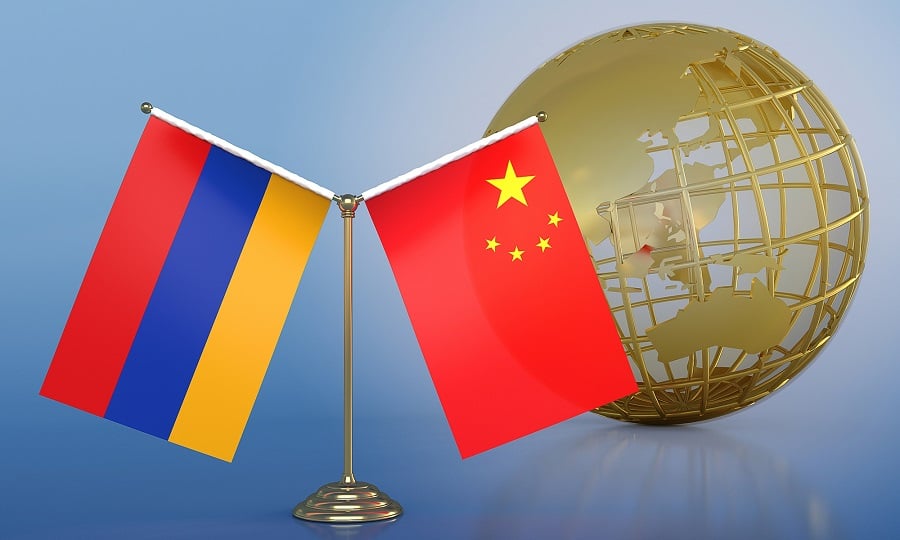The Armenian Mirror-Spectator. As I have argued in my previous Mirror-Spectator article, it is essential for Armenia to seek options for enhanced cooperation with China, within platforms such as BRICS, Shanghai Cooperation Organization (SCO) and the Chinese “Belt and Road Initiative” (BRI). Armenia appears to be the only country (probably with the exception of Georgia) among other regional players that has not worked in that direction.
However, certain changes seem to have taken place. During his recent visit to China, Armenian Foreign Minister Ararat Mirzoyan gave an interview to China Global Television Network (CGTN) where he touched upon deeper cooperation issues. Mirzoyan highlighted that the so-called Crossroads of Peace Initiative, a project widely promoted by Armenian Prime Minister Nikol Pashinyan, coincided with the vision of BRI in its aim to ensure better connectivity between Europe and Asia. Mirzoyan also announced that Armenia wanted to increase Armenia’s participation in the SCO. Currently, Armenia holds the status of dialogue partner within the organization, which it had obtained back in 2016. During his press conference on July 16, 2025, Pashinyan spoke not just of increased cooperation but full membership in the organization.
Unlike Armenia, regional players have previously shown a deeper interest and have established certain grounds for cooperation. This aligns with the South Caucasus regional powers’ desire to reduce Western geopolitical influence in the region, through endorsing the new player, China.
Turkey obtained dialogue partner status at SCO in 2012. It had also made a formal application to join BRICS during the organization’s summit in Russia, in 2024, which, however, did not yield a positive result, reportedly because of India’s rejection of Turkey’s bid. Erdogan had long sought BRICS membership as an active regional player, but when four countries – Iran, Egypt, Ethiopia and the UAE – became BRICS member states in January 2024, Turkey made an official move.
Read also
Turkey also joined the BRI in 2015, two years after the Chinese president’s announcement. As of summer, 2022 Turkey secured $4 billion BRI investment, which makes Turkey a minor recipient of Chinese funding, at only 1.3%. Involvement in such large-scale investment projects and other global initiatives are a matter of prestige for the country and Turkish authorities.
Iran is a full member of both SCO and BRICS. Iran became an SCO member in 2021, after holding an observer status for 15 years. BRICS membership is relatively new, starting from January 1, 2024. Iranian officials themselves referred to it as “a strategic victory for Iran’s foreign policy.” Amid strained relations with the US, Iran and China signed a 25-year cooperation agreement on March 27, 2021, which is expected to bring $400-600 billion of Chinese investments into the Iranian economy. Many of the projects under the agreement were reportedly aligned with the Chinese BRI.
Russia is a founding member of both the SCO and the BRICS. On top of that, Russia and China have been cooperating through various channels that would bypass the West and its influence. Strained relationships with the West have given both countries an impetus to explore areas for a deeper cooperation. The trade turnover between the two countries reached a record $244.8 billion in 2024. On the 75th anniversary of the establishment of diplomatic relations in 2024, China and Russia issued a joint declaration on “deepening comprehensive strategic interaction” to enhance cooperation in a wide range of areas, including military. Russia and China also have agreed on working to coordinate the BRI with Russian largescale Eurasian cooperation.
Azerbaijan formally received SCO dialogue partner status in 2016, after signing the memorandum. In 2024 Azerbaijan and China signed a declaration on the establishment of a strategic partnership and Azerbaijan expressed its desire to join BRICS. Azerbaijan has been actively seeking to cooperate within the BRI and China.
Georgia also signed a joint declaration on strategic partnership, one year earlier than Azerbaijan, in 2023, during Georgia’s prime minister’s visit to China. However, Georgia has shown little interest so far to join the BRICS and has no status within the SCO. As for BRI, Georgia is pursuing Chinese investment through its framework. Chinese private firms have invested in Tbilisi and Kutaisi. The Baku-Tbilisi-Kars railroad project which falls within the BRI has been operational since 2017. Back in 2017, Georgia signed a free trade agreement with China, making it the first such agreement between China and any post-Soviet state.
Both Georgia and Azerbaijan are members of the Asian Infrastructure Investment Bank (AIIB), led by China.
In sum, all of Armenia’s neighbors, except Georgia, are showing interest in BRICS and related platforms, and want to deepen cooperation with the organization by becoming member states.
Despite the assurances and statements made by the Armenian side, I believe it is prudent to wait and observe further developments. Armenia has, on multiple occasions, demonstrated a tendency to shift its foreign policy preferences rather quickly, and it is not unlikely that this could be another such instance.
At present, we are dealing solely with public statements — no official steps have been taken. Should Armenia continue to distance itself from China’s Belt and Road Initiative, this may have a significant impact on the diversification of its economy. Moreover, if Georgia further strengthens its political ties with China, Armenia risks becoming politically isolated from all other states in the region.
Therefore, it is essential that Armenia not only expresses support for joining the BRI but also undertakes concrete and practical steps in that direction.



















































